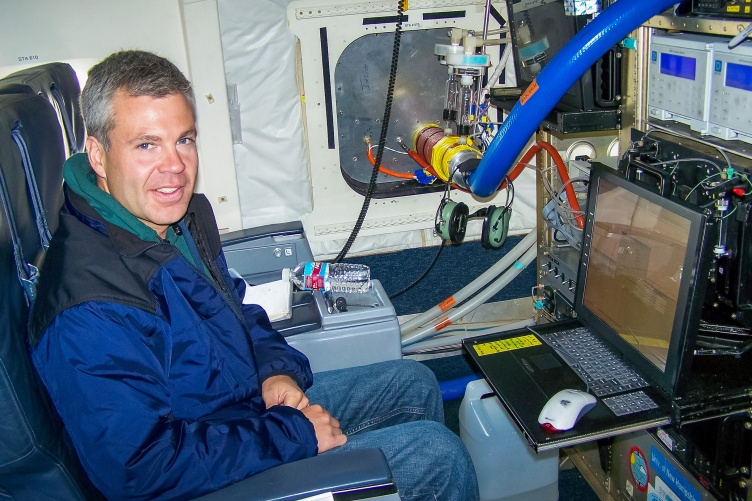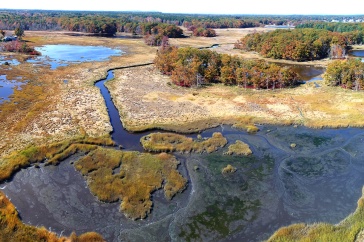
Eric Scheuer, a long-time research project engineer in UNH’s Earth Systems Research Center (ESRC), passed away on May 6, 2022, in Durham, New Hampshire. He was 51 years old.
Scheuer earned two degrees at UNH: his Bachelor of Science in water resources management in 1992, and a Master’s Degree in Earth sciences in 2009. Scheuer stayed on at UNH after graduating in 1992, where he conducted research on atmospheric chemistry alongside Jack Dibb, a research associate professor, and Bob Talbot, previous director of the ESRC when it was formerly known as the UNH Climate Change Center. Scheuer’s research took him around the globe, mostly flying on NASA's DC-8 airborne laboratory while ensuring that UNH's air sampling instrumentation was working properly. He participated in numerous NASA campaigns, including various Pacific Exploratory Missions and ATom searching for the world’s cleanest air, and more recently, sampling extreme local and transported pollution over Korea during KORUS-AQ and wildfire smoke for FIREX-AQ.

Dibb fondly recalls traveling all over the world with Scheuer on these campaigns. They would often have a few days in between flights, so they would spend time enjoying new sites and cuisines. Dibb notes that they had both seen the Northern Lights in Greenland and Churchill, Manitoba, the Moai statues on Easter Island and massive green sea turtles on Ascension Island during the course of their careers. Then it was back to the long flights focused on data collection, where Scheuer was by all accounts a hardworking and positive member of the research team.
“Eric would help anyone out if he could, either on the research campaigns or back at UNH,” Dibb says. “He had the attitude that we’re all in this together, and he was really recognized as being the go-to guy for assisting with almost anything when someone was in need.”
Sheuer’s colleagues from NASA spent many years working — and laughing — alongside him. Here are memories from several of them:
Carolyn Jordan, associate research fellow at the National Institute of Aerospace and member of the NASA Langley Aerosol Research Group says, “Eric was highly skilled with building the in-flight instrument systems and the logistics required for assembling a temporary lab on the ground anywhere in the world where the DC-8 deployed. Further, he made them simple to use for students and colleagues that deployed with the group who did not have his expertise. But perhaps his most astonishing gift for airborne research is he never suffered from motion sickness. Eric was suited to airborne measurements like a duck to water. I will always remember his ready smile and laughter, his great sense of humor, his gift for telling stories from his field adventures. He will be truly missed.”
James Crawford, senior scientist for atmospheric chemistry at NASA Langley Research Center, says, “Eric and I both went to the field for the first time in 1993, and he became part of my family away from home for almost 30 years across numerous NASA airborne sampling campaigns. There isn't much time for rest in the field, and Eric's tireless efforts and passion for our work documenting the state of the atmosphere made it feel easy. Even his complaints came with a smile and a wink that acknowledged he was right where he wanted to be, and we were glad he came along for the ride.”
Barry Lefer, program scientist for the Earth Science Division and tropospheric composition program manager at NASA, notes, "Back when I was a graduate student at UNH in the early 1990s, I was looking for a couple of undergraduate students to help me collect and analyze trace gas and aerosol samples from a tower at Harvard Forest. I was fortunate that Eric applied, and I was excited to get him on the Talbot and Dibb team as he already had laboratory sample analysis experience and it was clear he knew much more about engineering and electronics than I ever would. Before too long he was improving and rebuilding our ion chromatography system. It was so much fun to catch up and hang out with Eric on the various NSF and NASA airborne field campaigns over the past 20 some years. And I was always amazed to see how he continued to update and improve the instruments and analytical systems. But most memorable is Eric's loud laugh and big heart."
Matt Berry, chief of Code 430 Operations Engineering Branch at NASA’s Armstrong Flight Research Center (AFRC), says, “Eric was a great guy and a pleasure to work with during my time on DC-8. [He was] one of the many reasons the team has been one of the most consistent, dependable and long-time residents on the DC-8 platform. I will always remember the dedication to work, great attitude and willingness to work with everyone to get the job done that Eric always brought when he assisted the payload integration, flights and de-integration efforts both at AFRC and on the deployments. He will truly be missed.”
-
Written By:
Rebecca Irelan | Institute for the Study of Earth, Oceans, and Space | rebecca.irelan@unh.edu | 603-862-0990
















































